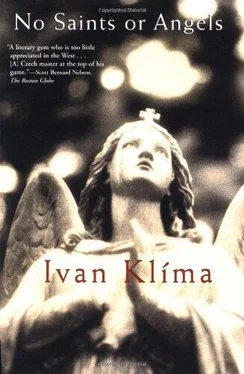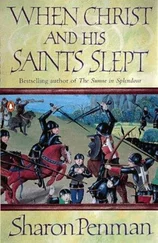'What am I going to do with all those things?' Mum laments. She opens a wardrobe stuffed with old clothes that stink of mothballs and I discover to my horror that the vile grey uniform of the People's Militia is still hanging there. He didn't even throw that away. As if he wanted the shame to survive him. Es war, als sollte die Scham ihn überleben. That was written by an author Dad never read. I used to read him because he was virtually banned and because he tended to be sad and lonely too. And he was scared of his father and the future. Maybe he was also scared because he was a Jew like my Grandma Irena, who died horribly in the gas chamber ten years before I was born. He would have ended up there too if he hadn't died so young. I wonder whether Grandma was scared of the future too. Was she able to imagine it? Could anyone imagine it, in fact?
'Do you think you could make use of any of it?'
'But, Mum, there's no man living at our place.'
'I know, but maybe you could get it altered.'
'Yes, that one in particular,' I say pointing at the uniform.
'That's all you ever see. Dad was already that way inclined. He didn't alter overnight like a lot of others. . He had that made for our wedding,' she says indicating a black suit whose origins I've heard about a hundred times already.
'I know.'
'It's one hundred per cent wool. Wool was very hard to come by in those days.' Mum sorts through the suits and frets. She can't just throw them out, can she? But she doesn't know anyone who might need them. I sense behind it a reproach that I'm on my own. If only I'd managed to hold on to my man as she had, right up to the last, even if it meant being made a slave, then I could bring him home a caseload of old, worn-out, useless rags.
I tell her I'll help her sort the clothes and what is reusable I'll take to a charity shop or to a homeless shelter.
'And what about the uniform?' she asks. 'Do you think a museum might take it?'
'They're bound to have wagonloads of uniforms like it. And just one would be enough for posterity.' I imagine the display case: 'Uniform of the People's Militia, mailed fist of the working class. Donated from the bequest of Alois Horák.'
'So what shall we do with it?' Mum asks.
'Cut it up for rags. You should have done it long ago.'
I happened to be born at a moment when Alois Horák and others of his ilk had been put on alert. Naturally — it was the day God's little messenger finally rid the world of the Soviet tyrant. Mum told me how, when they were carrying me screaming out of the labour ward, she looked out the window and was amazed to see a black flag slowly being raised on the flagpole. Dad first came to visit Mum three days later. He was wearing his uniform, and now and then he would start crying. He asked my mother as she showed him the baby, in other words me, 'What are we going to do now? How will we live?' His desperate question had nothing
to do with how he'd live now he'd become a father, but how he'd live now the tyrant was dead and he was left an orphan. It was a slight against me and it was only my third day in this world about which I suspected nothing. He was a master at slighting others or making them feel guilty.
'Kristýna! He'd never get over it.'
'Oh, yes he would,' I say, but don't add that he's dead and gone and it's time she stopped deferring to him in slavish fashion. But Mum is only using him as an excuse: she'd never destroy anything while it could still be used. The war had left its mark on her. When she had to buy herself new clothes she always felt it as an offence against her relations who died. I didn't survive it to doll myself up! is something I heard her say on countless occasions, so I always felt guilty any time I indulged in something new.
'They wrote in the papers,' Mum says suddenly, as if she'd just recalled, 'that the skinheads had a rally and were shouting Sieg Heil. And the National Security just let them.' Mum still hasn't got used to the fact that we've had a normal police force for the past nine years — or at least we call them normal.
'Don't worry, nobody's going to resurrect Hitler.'
'It's not myself I'm worried about, but the two of you. Goodness knows what they're up to.'
I stroke her hair. 'Don't worry about us. The world has changed.' Just recently she's talked about feelings of anxiety she must have had since she was small. I never suspected it because she never let on. On the contrary, she was always full of life, and worries never got her down. For years she worked in the municipal housing office in charge of maintenance. It meant she came into contact with lots of workmen and from time to time she would take me along with her. And although I tended to be miserable among strangers I liked the way she was able to have a laugh and a chat with them. And at home, too, particularly when Dad was out at some meeting, which he was almost all the time, she used to laugh at things that would have most likely irritated my father.
She takes me over to a cupboard that is full of books. 'And what about these?'
'There's no need to get rid of the books, is there? The moths aren't going to harm them.'
'His books? I'm never going to read them, am I?'
Yes, of course: books by the Soviet luminaries, their covers as boringly grey as the language they were written in; a red star above the title, symbolizing the blood shed on their account.
'Oh yes, and there are all sorts of letters and things,' Mum remembers. 'I can't bring myself to sort them out. And there are some letters from you.'
I can't recall ever writing to Dad. But I expect I did. Maybe from Pioneer camp. 'They can stay here, can't they?'
'And loads of speeches and notes.'
Dad trained as a locksmith, but he didn't repair many locks in his life. He was in charge of political indoctrination and was also a paid official, so he had to give speeches. I never heard or read any of his speeches but I can well imagine them, having heard plenty of others. They were all the same. Cold grey tedium that nevertheless managed to arouse dread because the spectre of that bloody star hovered above it.
'I've wrapped up these things for you. I thought you might like to find out something about your dad. That he wasn't as awful as you imagine.'
'Mummy, what could I possibly find out? I knew him for forty-five years. Every year on my birthday he'd light a candle in memory of a murderer he never set eyes on. And he'd buy a white carnation to put in front of the bust of him that he had on his desk. He bought me flowers about three times in my life. And of course they had to be carnations because they were sort of comradely.'
'It's ages since he did anything like that.'
'Really?' I won't tell her that it was probably because he begrudged the money for the candle and the carnation. In recent years he didn't even send me a flower. In fact he didn't even visit
on my birthday; he just telephoned to wish me lots of success. I don't know what he had in mind. Whether some dazzling career in dentistry, or a splendid marriage, or first place in the competition for the most beautiful elderly woman. Nothing, most likely. For him success was happiness. There was no love lost between us. There was a time when we used to argue, though we even stopped that. But we didn't start to like each other. Lack of affection for one's father would seem to run in our family. I wouldn't say he was never right. He tried to talk me out of marrying my first and last twice-divorced husband. 'He's a man without ideals,' he warned me.
Better none than yours, I thought.
I've now discovered that people without ideals are like machines. Machines for churning out words, making money and love, degrading others and exalting themselves, machines for supporting their own egos. Dad had ideals, I'll grant him that. Maybe he really did believe that with his Party in power nobody would go hungry and justice would be established in the world. It was such a blind belief that he couldn't see all the injustices being committed around him. He himself tried to lead an honourable and even abstemious life. He had just one suit for weekdays and the famous wedding suit. When it was cold he would wear the same old beret he'd had since I was a child. He was terse with Mum, but he never left her and I don't think he was ever unfaithful to her. I don't remember ever getting a hug from him, but from time to time he would tell me stories about wise Lenin or Young Pioneers who loved their parents and their homeland. Yes, they were the phrases he'd use, but at the time I was just happy that he sat down by me and spared me a bit of his time. It was only later, after the Soviets invaded and he welcomed them as saviours not occupiers, that I became antagonistic towards everything he praised or believed in.
Читать дальше












